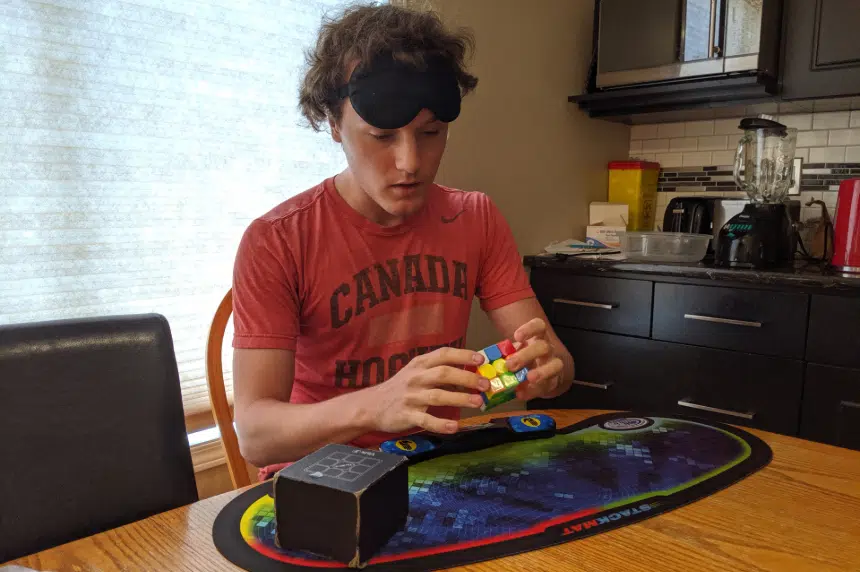Jake Klassen is one of the world’s best at what he does but the 19-year-old science student at the University of Saskatchewan catches people by surprise when he tells them he is a world champion at solving Rubik’s Cubes while blindfolded.
Klassen first entered the world of solving Rubik’s Cubes, or “cubing” as he call it, as a seven-year-old child.
After dismissing that original cube his mother handed him for years, Klassen picked up the game in Grade 9 when a few friends started playing around with Rubik’s Cubes and slowly got Klassen interested in the game.
Within a few months Klassen was hooked.
To him, the natural progression to get better and challenge himself was to try and solve a Rubik’s cube as fast as possible while blindfolded.
“When I saw this, I thought this is my thing. This is something I can become the best in the world at, and I eventually did,” he said.
A year later, Klassen was entering local competitions near his hometown Calgary, Alta. A year after that in 2017, Klassen broke his first Canadian record for solving a Rubik’s Cube while blindfolded in 26 seconds. That same year, Klassen broke the North American world record by solving the cube in 19 seconds to land at No. 3 in the world rankings.
Those competitions led him to his breakthrough moment last May when he broke the world record in Ottawa with the first ever average of three solves blindfolded at 19.79 seconds.
It dawned on him shortly afterwards what an odd, but incredible accomplishment he just achieved.
“I didn’t grow up dreaming how to become the best at blindfolded Rubik’s Cube solving but I always dreamed at being the best at something as a bucket list item,” Klassen admitted.
That feat took him to Australia a couple months later to compete at the Rubik’s Cube World Championships.
He never imagined something as simple as a Rubik’s Cube would have him flying across the world for competitions.
“Never in a million years. I still find it hard to believe. I’ve met so many people, I’ve made so many really good friends. I would no idea what my life would be like without this. I think (my life) would be a lot less interesting.”
The art of blindfolded Rubik’s Cube solving
The process of solving a Rubik’s Cube as fast as you can becomes a complicated process when you add blindfolds.
With the underground craze being a relatively new phenomenon, there weren’t many resources to perfect his craft when Klassen first started looking into competitions.
Through some collaboration, Klassen and a few online friends pioneered a method to solve the cube faster. He would exchange his ideas, eliminate different methods and add different tricks to shave milliseconds off of his personal best.
“There weren’t a lot of resources. Back then, it was a lot of trial and error. I really enjoyed that part (of) developing the method,” Klassen said.
Klassen’s system seems relatively straightforward. He spends roughly six seconds to memorize the cube and then attempts to solve it in nine or 10 seconds.
Once he pulls the cube out of the box, he assigns each square a letter. Then he creates a virtual train of pieces in the order he wants to solve the cube in, then he does his best to make sounds out of those letters. Letters, L-A-M-P become LAMP, for instant audio memory, better known as echoic memory.
Klassen compared the system of solving the cube to remembering two phone numbers, or 20 digits.
“You have to memorize all the letters, and then repeat them in your head, and as you repeat them you’re solving those pieces,” he said.
Ever wanted to see one of the fastest people to solve a Rubik's Cube while blindfolded do his thing? Here's Jake Klassen to satisfy that curiosity. pic.twitter.com/y7SOZ2S3DH
— Keenan Sorokan (@KeenanSorokan) October 12, 2019
Complicating matters further are the performing aspects when he enters larger competitions. There were roughly 1,000 people in Melbourne watching the action while professional camera crews buzzed around the floor to provide a live stream for thousands more viewers online.
That sort of audience has caused some huge growth in the industry. Klassen said colleagues of his in places like China and Australia are making decent wages coaching competitors.
Klassen has slipped one spot in the world rankings to sit at No. 4 in the world. He feels his time at the top may never come again, but it’s not waning his interest in Rubik’s Cubes.
“I’ve essentially reached a limit. It would very difficult for me to improve without dedicating hours and hours a day,” he said. “The world records are within reach if I perform well. I’m just going to treat it as a fun hobby where I’m able to travel a bit.”
Many competitors continually notice him at competitions and wish him well. Being a world-class Rubik’s Cube competitor is a title he has a hard time shedding.
“They’re usually pretty shocked,” he said of people’s reactions to his hobby.
“I try not to lead with that when I’m meeting people because it’s the only thing they remember about me. I want to be known, at least with in my own friends, as more than just the cube guy.”







